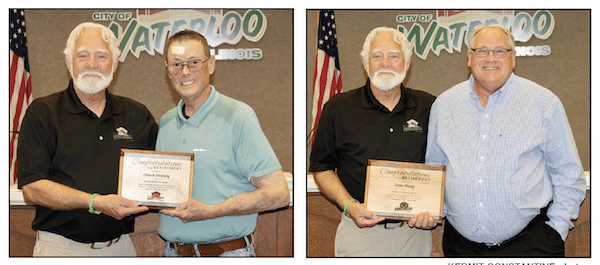Thirty electric years in Waterloo

Two longtime members of the Waterloo Public Works Department were recognized at Monday’s City Council meeting for their many years spent building, maintaining and repairing the city’s electric system.
City of Waterloo Journeyman Lineman Tom Maag and Distribution Foreman Chuck Steppig have both spent 30 years with the department, focusing on the town’s wide range of electrical needs.
Both grew up in Waterloo, though Maag said he was born and raised here.
After finishing high school, Maag attended Bailey Technical School with plans to focus on engineering and mechanics.
“When I was in high school, I went to Beck Vocational Center, and I actually learned small engine repair which is things like mowers and motorcycles and stuff like that,” Maag said. “I’d hoped to make a living as a mechanic, but I changed course on the way through.”
Maag later found himself working at Don’s Electric Contracting in town, where he was able to hone his wiring ability and other skills as an electrician.
Eventually, a high voltage job with the city opened up and he was happy to join despite the lack of experience doing linework.
“It just seemed like a good opportunity to change my career path and do something that had broader opportunities,” Maag said.
While the change from relatively smaller wiring and repair jobs to high voltage work on powerlines might seem major, Maag said it all came rather naturally given his experience.
“It was actually just like working on larger equipment, but a lot of the same basics all apply across the board,” Maag said. “It was not difficult at all because what I learned working with the people at Don’s Electric, I had gotten a pretty broad spectrum of what it took to be in the electrical trade.”
Regarding his overall experience with the department, Maag spoke about upgrade projects for the city’s power generator as well as all the work done within city limits as a great deal of residential development took place.
What seemed to stick with Maag the most, however, was all the work needed to be done following big storms that hit town.
“One time we were out in the dark, freezing rain, standing on Lakeview Drive, and we had outages everywhere,” Maag said, “and it was so quiet that you could hear stuff on the other side of town falling apart, shorting out, see the blue flashes in the dark sky, and you could hear the trees falling apart behind you in somebody’s backyard tearing down more wires going into the houses.”
This storm repair also included mutual aid for communities near and far.
Maag specifically mentioned traveling down to Metropolis following bad storms that hit there a number of years.
Maag looked back on his time with the department rather fondly, saying that at his age, its simply time for him to step away and enjoy retirement – though he doesn’t have specific plans for his newfound free time.
“It’s worked for me all these years to live here in town,” Maag said. “At one point in time I worked for a dealership that was way up in Florissant (Mo.), and I’m not a morning person so I found that to be a struggle. Getting up and being able to go to work on the other side of town was something that fit me real well throughout my career.”
While also recognized alongside Maag during Monday’s council meeting, Steppig actually retired last year after his 30 years with the city were over.
While not exactly a Waterloo native, Steppig moved to the community in the sixth grade, later graduating from Gibault Catholic High School.
Looking to minimize his time spent in academia, he attended Rankin Technical School to study industrial electric for two years.
Like Maag, Steppig said he’s long had an affinity for hands-on work.
“I was always better with my hands than schoolbooks, and I’m very mechanically inclined, can take things apart and put them together,” Steppig said.
After Rankin, Steppig joined up with 309 Union Hall in Collinsville, a labor union for electricians, mechanics and other trade professions.
Steppig worked with them as a wireman for a time, but around 1991, work became rather sparse and difficult, so he too sought one of the utility openings in Waterloo.
Steppig explained his inclination for the electrical trade, noting his interest might largely be explained by one incident as a child.
“For some reason the electric field just roped me in,” Steppig said. “I think it had something to do with when I was a little kid, and I stuck a screwdriver in the light socket of the Christmas tree, and there was an arc, and it’s like, “I wonder what that was? Now all the lights are out in the house.’”
As a foreman, Steppig’s duties largely revolved around managing tools, materials and worker oversight, though he spent plenty of time himself working with his hands after a four-year lineman apprenticeship with the city.
He spoke about the work that came as the city expanded and added new subdivisions, recalling how he and his team set up over seven miles of wiring one year.
Steppig echoed Maag’s sentiments regarding storm repair and mutual aid with municipalities in Southern Illinois, adding he would always watch the weather before bed to know if something was coming.
His job satisfaction came largely from the sheer variety of work.
“It was never the same, that’s what I really enjoyed about it,” Steppig said. “One day we’d be working on high voltage, 13,200 volts, and then maybe two hours later you’re working at a lift station for the sewer department working on 110 volts. It was never the same.”
Steppig also spoke quite highly about all the people he got to know and work with on the job, including Waterloo Director of Public Works Tim Birk and longtime alderman Charlie Metzger, who was closely involved with the city’s electric operations.
Things became rather difficult in last few years as the COVID-19 pandemic caused plenty of trouble in getting materials.
While it marked his 30th year with the city, Steppig’s departure last year also came as he decided he simply didn’t need the stress that came with the job.
Having dealt with health problems for some time, a recent upturn also seemed to be a good reason to step away.
Steppig said that, as he has been forced to rely on dialysis for some time, a kidney replacement shortly after retirement has been thoroughly refreshing – he plans to continue enjoying the freedom that’s come with it.
“My health is improved, and we’re doing more traveling now because we don’t have to be tied to that machine,” Steppig said. “I’ve been told by a lot of people, ‘Oh your yard sure looks nice.’ Well now I have time to do it!”






